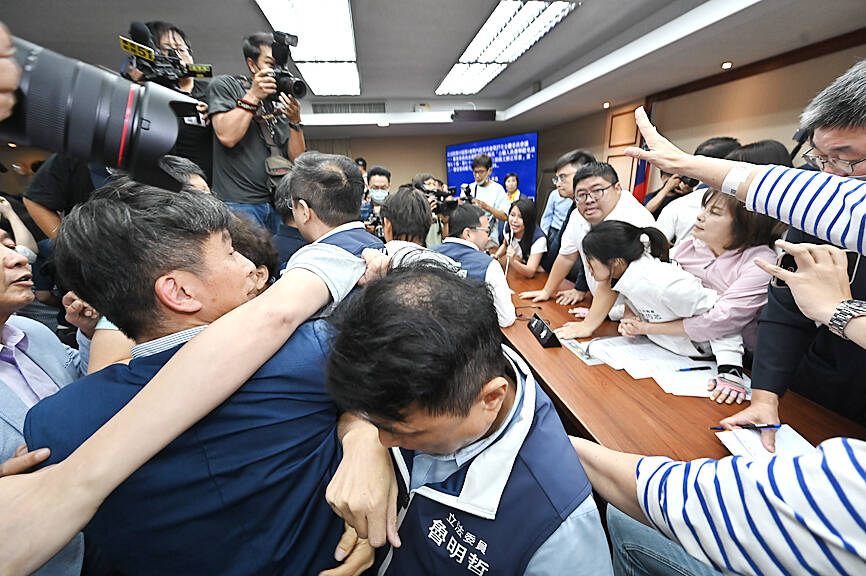Physical fights yesterday morning erupted at the Legislative Yuan among lawmakers who support and oppose proposed amendments to the Civil Servants Election and Recall Act (公職人員選舉罷免法), which are aimed at tightening the requirements for recalling an elected official.
Before the meeting at the legislature’s Internal Administration Committee to review the amendments started, lawmakers mobilized by the Democratic Progressive Party (DPP), which opposes the amendments proposed by the Chinese Nationalist Party (KMT), occupied the podium of the chairperson of the meeting in a bid to stall the review process.
The occupation of the podium by DPP lawmakers upset KMT legislators and escalated into physical violence.

Photo: Tu Chien-jung, Taipei Times
DPP Legislator Lin Chu-yin (林楚茵) said KMT Legislator Wang Hung-wei (王鴻薇) slapped her in the face, causing her chin to bleed.
Lin said Wang slapped her face several times, knocking off her earrings. She said she would go to a hospital to have her injuries examined, which would provide her with the evidence to sue Wang.
Wang said Lin grabbed and hit her, and kicked her furiously.
She said DPP Legislator Huang Jie (黃捷) also kicked her, adding that Huang’s move was a “villainous act.”
“Shame on the DPP,” Wang said. “The DPP was the instigator, but the first to complain.”
KMT caucus secretary-general Hung Mong-kai (洪孟楷) said his caucus has obtained surveillance footage which showed that Huang damaged the meeting room door at 4am and DPP Legislator Chung Chia-pin (鍾佳濱) did the same to enter the meeting room at about 5am to occupy the podium.
Hung said the DPP are troublemakers, not only vandalizing a public facility, but also blocking a review meeting, adding that the KMT would publicize the surveillance footage.
Huang accused the KMT caucus of attempting to block lawmakers and other legislature personnel from entering the meeting room yesterday morning, adding that the KMT caucus tried to change the meeting venue for yesterday’s law review.
The KMT has proposed amendments raising the threshold for recalling an elected official in the election and recall act, saying the current threshold is too low and makes it too easy to recall elected officials.
For a recall vote to succeed, the number of votes cast in favor must exceed those cast against it and be equal at least one-quarter of all eligible voters in the district.
The KMT’s proposed revision stipulates that the number of votes cast to support the recall should exceed the number of votes the elected official had acquired when elected. It would also require that votes in favor of recalling an official exceed those cast against it and be equal to at least 25 percent of all eligible voters.
Among other amendments to the election and recall act, an article initiated by both DPP and KMT lawmakers would allow absentee voting for indigenous voters, which aims to increase the willingness of people in remote areas to cast their ballots.
DPP caucus whip Ker Chien-ming (柯建銘) said the revisions proposed by the KMT would infringe on the public’s right to recall an elected official, adding that the amendments are a “caged” election and recall act.
Taiwan People’s Party Chairman Ko Wen-je (柯文哲) said he opposed the higher recall requirements, but favored tightening the rules to collect signatures to allow a recall vote to proceed.

An undersea cable to Penghu County has been severed, the Ministry of Digital Affairs said today, with a Chinese-funded ship suspected of being responsible. It comes just a month after a Chinese ship was suspected of severing an undersea cable north of Keelung Harbor. The National Communications and Cyber Security Center received a report at 3:03am today from Chunghwa Telecom that the No. 3 cable from Taiwan to Penghu was severed 14.7km off the coast of Tainan, the Ministry of Digital Affairs said. The Coast Guard Administration (CGA) upon receiving a report from Chunghwa Telecom began to monitor the Togolese-flagged Hong Tai (宏泰)

A cat named Mikan (蜜柑) has brought in revenue of more than NT$10 million (US$305,390) for the Kaohsiung MRT last year. Mikan, born on April 4, 2020, was a stray cat before being adopted by personnel of Kaohsiung MRT’s Ciaotou Sugar Refinery Station. Mikan was named after a Japanese term for mandarin orange due to his color and because he looks like an orange when curled up. He was named “station master” of Ciaotou Sugar Refinery Station in September 2020, and has since become famous. With Kaohsiung MRT’s branding, along with the release of a set of cultural and creative products, station master Mikan

RISING TOURISM: A survey showed that tourist visits increased by 35 percent last year, while newly created attractions contributed almost half of the growth Changhua County’s Lukang Old Street (鹿港老街) and its surrounding historical area clinched first place among Taiwan’s most successful tourist attractions last year, while no location in eastern Taiwan achieved a spot in the top 20 list, the Tourism Administration said. The listing was created by the Tourism Administration’s Forward-looking Tourism Policy Research office. Last year, the Lukang Old Street and its surrounding area had 17.3 million visitors, more than the 16 million visitors for the Wenhua Road Night Market (文化路夜市) in Chiayi City and 14.5 million visitors at Tainan’s Anping (安平) historical area, it said. The Taipei 101 skyscraper and its environs —

Taiwan on Friday said a New Zealand hamburger restaurant has apologized for a racist remark to a Taiwanese customer after reports that it had first apologized to China sparked outrage in Taiwan. An image posted on Threads by a Taiwanese who ate at Fergburger in Queenstown showed that their receipt dated Sunday last week included the words “Ching Chang,” a racial slur. The Chinese Consulate-General in Christchurch in a statement on Thursday said it had received and accepted an apology from the restaurant over the incident. The comment triggered an online furor among Taiwanese who saw it as an insult to the